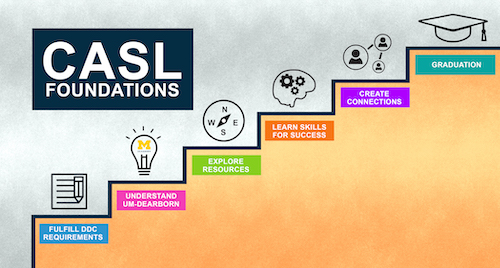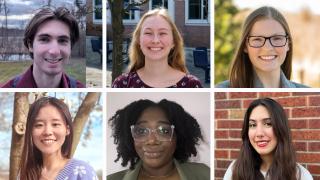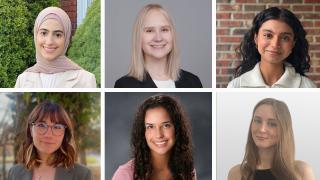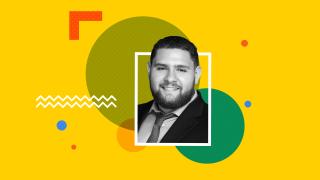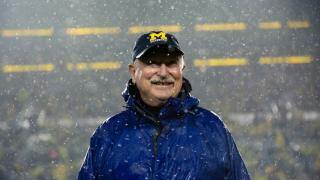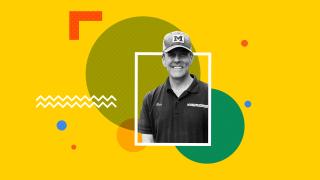
When beginning something new — job, family, education — there’s always a learning curve. But it doesn't have to be difficult. A new campus program for incoming students wants to make sure the transition to higher education and the Dearborn campus is welcoming, interesting and informative.
The CASL Foundations Program, which begins this fall, takes general education requirements — called the Dearborn Discovery Core (DDC) — and turns them into a close-knit campus-learning experience for all incoming CASL freshmen and transfer students.
CASL Foundations Director Georgina Hickey said the program is about creating connections with other incoming Wolverines, learning about campus resources, and opening a trusted line of communication between student and professor.
And what makes this program, which is required for new CASL undergraduate students, particularly unique is the attention to transfer student needs — even though they may have had a previous collegiate experience, Hickey said there are many things that are beneficial to learn about the UM-Dearborn experience when first coming to campus like available resources, how to get involved or who to contact for internship opportunities.
Hickey said the CASL Foundations program isn’t built around disciplines or majors. Instead each course — created by the faculty member based on their expertise — is developed around the shared CASL Foundation goals of giving incoming students a solid footing as they begin their educational journey.
“These courses will help students — freshmen and transfer — find their way at UM-Dearborn, feel like they belong, give them tools to succeed, and offer some help in planning what they want to get out of their time on campus,” she said. “They will learn content, but these courses are a bit more focused on explicitly teaching critical thinking skills and supporting students while they get acclimated.”
New courses give a fresh take on subjects like physics, history, math and English. To encourage camaraderie, classes are capped at 24 students.
Courses include:
- Physics for 21st Century Citizens.This physics-based class shows students how today’s widely-used technology regularly builds off of ideas that seem distant — for example, your phone needs to understand Einstein’s special and general relativity for the GPS to work properly.
- American Horror Stories.Nightmares can sometimes be at the heart of the American dream. This course analyzes American culture and history through the lens of the horror industry.
- Infinity Plus One.How much math do you really need to know? This class looks at how understanding math can help you choose the right mortgage, decide between leasing or buying, and see how a district is gerrymandered.
- Because Internet: The Language of Digital Media. This course examines how new forms of language emerge (most recently through the digitization of communication), how people define themselves through their language choices, and the social associations made through those choices.
- Crossing Boundaries: ‘Passing’ and Social Identity in American History. Have you ever thought that life would be easier if you had been born a different person? The class looks at the experiences of people who “passed” in different social groups to better understand social categories and how they have changed over time.
Hickey, who is teaching the Crossing Boundaries course, said there are more than 25 CASL Foundations courses offered next academic year. Prior to course sign-up, students can learn a bit about the professor teaching the class too; each course section includes a short faculty bio.
Hickey, a professor of history who has taught for 20 years at UM-Dearborn, said it was important to create a formalized program letting students know what supportive resources were out there.
Hickey said it’s often hard to know who to ask and what to ask when new, and she remembers the feeling. “There were a number of baffling moments in my first year of college where it sure would have helped if someone had explained why we were doing the assignments we did or if I'd felt like I had a faculty member I could ask about things that others seem to already know.” She said many of the professors teaching in the CASL Foundations Program were first-generation students who remember the confusion they felt when navigating college.
“We are committed to making sure students new to our campus learn about the university, learn how to navigate campus and learn how to access the amazing resources available to them,” she said. “We want students to know that they can come to us; we are here to help them succeed.”

